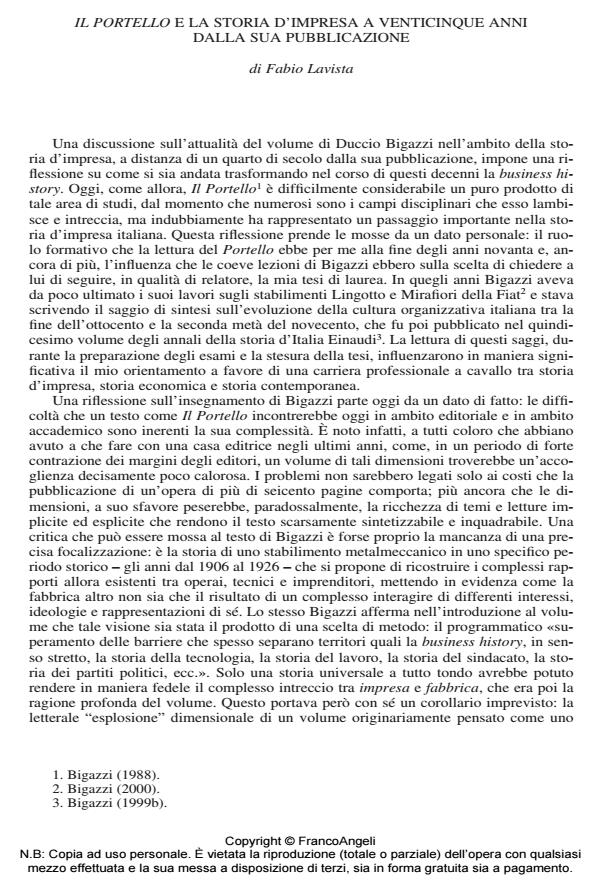Il Portello and Business History 25 Years After
Journal title SOCIETÀ E STORIA
Author/s Fabio Lavista
Publishing Year 2015 Issue 2015/147 Language Italian
Pages 9 P. 121-129 File size 508 KB
DOI 10.3280/SS2015-147008
DOI is like a bar code for intellectual property: to have more infomation
click here
Below, you can see the article first page
If you want to buy this article in PDF format, you can do it, following the instructions to buy download credits

FrancoAngeli is member of Publishers International Linking Association, Inc (PILA), a not-for-profit association which run the CrossRef service enabling links to and from online scholarly content.
The article evaluates the relevance of Duccio Bigazzi’s lesson for present-day Economic and Business historians. Taking into consideration the evolution of these disciplines in the last decades, the paper tries to understand in which way the peculiar attention to the complexity of historical processes that characterised Bigazzi’s works could be integrated with disciplines that sometimes seem to choose as their preferred method some sort of simplistic modelling.
Keywords: Business History, Labour History; Historical Method.
- Acemoglu D., Robinson J. (2012), Why Nations Fail: The Origins of Power, Prosperity, and Poverty, New York, Crown Publishers.
- Alesina A., Giuliano P., Nunn N. (2013), On the Origins of Gender Roles: Women and the Plough, in «The Quarterly Journal of Economics», 128, 2, pp. 469-530.
- Bigazzi D. (1988), Il Portello. Operai, tecnici e imprenditori all’Alfa Romeo 1906-1926, Milano, rancoAngeli.
- Bigazzi D. (1999b), Modelli e pratiche organizzative nell’industrializzazione italiana, in F. Amatori et al. (a cura di), Storia d’Italia. Annali 15. L’industria, Torino, Einaudi, pp. 895-994.
- Bigazzi D. (2000), La grande fabbrica: organizzazione industriale e modello americano alla Fiat dal Lingotto a Mirafiori, Milano, Feltrinelli.
- Bloch M. (1998), Apologia della storia, o, mestiere di storico, Torino, Einaudi.
- Boserup E. (1986), Woman’s role in economic development, Aldershot, Gower.
- Chandler A.D.Jr. (1977), The Visible Hand: The Managerial Revolution in American Business, Cambridge Mass., Belknap Press (trad. it. La mano visibile. La rivoluzione manageriale nell’economia americana, Milano, FrancoAngeli, 1981).
- Chandler A.D.Jr. (1990), Scale and Scope: The Dynamics of Industrial Capitalism, Cambridge (Mass.), Belknap Press.
- Croce B. (1989), Teoria e storia della storiografia, Milano, Adelphi.
- Feyerabend P.K. (1985), Contro il metodo: abbozzo di una teoria anarchica della conoscenza, Milano, Feltrinelli.
- Goody J. (1967), On the Reliability of the Ethnographic Atlas, in «American Anthropologist», 69, 3-4, pp. 366-367.
- Hirschman A.O. (2013a), The Rise and Decline of Development Economics, in The Essential Hirschman, Princeton, Princeton University Press, pp. 49-73.
- Hirschman Albert (2013b), The Search for Paradigms as a Hindrance to Understanding, in The Essential Hirschman, Princeton, Princeton University Press, pp. 137-154.
- Hobsbawm E.J. (1997), Storici ed economisti 2, in De Historia, Milano, Rizzoli, pp. 132-149.
- Lamoreaux N.R., Raff D.M.G., Temin P. (2003), Beyond Markets and Hierarchies: Toward a New Synthesis of American Business History, in «American Historical Review», 108, 2, pp. 404-433.
- Malanima P. (1997), Economia preindustriale: mille anni: dal IX al XVIII secolo, Milano, Bruno
- Mondadori.. Nelson R.R., Winter S.G. (1982), An Evolutionary Theory of Economic Change, Cambridge (Mass.), Belknap Press.
- Persson K.G. (2010), An Economic History of Europe: Knowledge, Institutions and Growth, 600 to the Present, Cambridge, Cambridge University Press.
- Raff D.M.G. (2013), How to Do Things with Time, in «Enterprise and Society», 14, 3, pp. 435-466.
- Rostow W.W. (1960), The Stages of Economic Growth, a Non-Communist Manifesto, Cambridge, University Press.
- Rowlinson M., Hassard J.S. (2013), Historical neo-institutionalism or neo-institutionalist history? Historical research in management and organization studies, in «Management & Organizational History», 8, 2, pp. 111-126.
- Simon H.A. (1976), Administrative Behavior: A Study of Decision-Making Processes in Administrative Organization, New York, Free Press.
- Skidelsky R. (2014), Post-Crash Economics, in Institute for New Economic Thinking Blog, 19 giugno
- Terlizzese D. (2006), Scelte economiche, in P. Ciocca, I. Musu (a cura di), Economia per il diritto:saggi introduttivi, Torino, Bollati Boringhieri, pp. 86-112
- La storia economica contemporanea in quaranta anni di "Società e storia" Marco Doria, in SOCIETÀ E STORIA 178/2023 pp.783
DOI: 10.3280/SS2022-178007 - La storia sociale contemporanea in Italia: tempi e temi Il caso di «Società e storia» Nicola Labanca, in SOCIETÀ E STORIA 178/2023 pp.743
DOI: 10.3280/SS2022-178006
Fabio Lavista, Il portello e la storia d’impresa a venticinque anni dalla sua pubblicazione in "SOCIETÀ E STORIA " 147/2015, pp 121-129, DOI: 10.3280/SS2015-147008